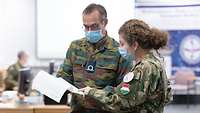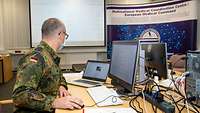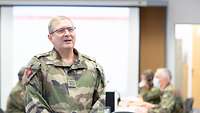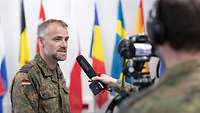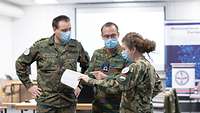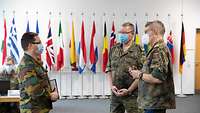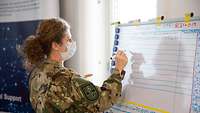Successful exercise: Multinational Wargaming Resilient Medical Interface
Successful exercise: Multinational Wargaming Resilient Medical Interface
- Date:
- Place:
- Germany
- Reading time:
- 3 MIN
The Multinational Medical Coordination Centre/ European Medical Command (MMCCMultinational Medical Coordination Centre/EMCEuropean Medical Command) has successfully demonstrated its operational capability with the exercise "Resilient Medical Interface (REMI'21)".
The MMCCMultinational Medical Coordination Centre/EMCEuropean Medical Command has proven that it can support and thus relieve its member nations as well as NATONorth Atlantic Treaty Organization and the EUEuropean Union by providing coordination services in a multinational environment. Colonel (NLD) Jürgen Muntenaar, MMCCMultinational Medical Coordination Centre/EMCEuropean Medical Command Deputy Director for NATONorth Atlantic Treaty Organization Affairs notes, "In providing support and coordination, we work not only with the individual nations, but also with EUEuropean Union and NATONorth Atlantic Treaty Organization military and civilian services."
Facilitator for experts and service providers
During REMI'21, possible medical service crises or incidents, some of which may cause supranational medical or paramedical hazards, were simulated at various locations on the European continent together with the respective nations. Examples of such crises are accidents with increased numbers of wounded or outbreaks of transmissible pathogens.
"In doing so, we try to provide the affected nations with appropriate stakeholders or service providers with the help of our network of experts," says MMCCMultinational Medical Coordination Centre/EMCEuropean Medical Command Deputy Director for EUEuropean Union Affairs, Colonel (FRA) Thierry Lanteri.
Passen Sie jetzt Ihre Datenschutzeinstellungen an, um dieses Video zu sehen
Multinational evaluation team provides evidence of operational readiness
During the four days of the hybrid exercise, the various processes of emergency medical response were played out with the participating nations and the relevant EUEuropean Union/NATONorth Atlantic Treaty Organization agencies. As in reality, tasks had to be carried out individually, in conjunction with each other or building on each other. This highlighted the various coordination and support capabilities of the MMCCMultinational Medical Coordination Centre/EMCEuropean Medical Command, with a focus on the Situation Centre.
Situation Centre as an instrument for bundling capabilities
As an instrument for structured processing, the MMCCMultinational Medical Coordination Centre/EMCEuropean Medical Command uses a situation centre, the "Situation Centre". Lieutenant Colonel Alexander J., head of the Situation Centre, reveals "If the complexity of a task requires the involvement of several MMCCMultinational Medical Coordination Centre/EMCEuropean Medical Command departments or if the fulfilment of the task is very time-critical, the SitCen is activated." There, the required information is collected, evaluated and the necessary coordination measures are initiated. By pooling all the capabilities of the MMCCMultinational Medical Coordination Centre/EMCEuropean Medical Command and integrating its network of experts, the aim is to react quickly to the needs of individual member nations or NATONorth Atlantic Treaty Organization and EUEuropean Union institutions.
International reservists as an integral part
The reservists from Great Britain, Belgium, France and Germany were fully integrated into the exercise process, the exercise structures and the team. This gave them a comprehensive insight into the planning and coordination processes in crisis scenarios with cross-border threats. With almost 20% of the total exercise personnel, it once again became clear how great the importance of reservists is also on an international level. "The fact that we are not only able to work multinationally with active soldiers, but also to integrate international reservists from different areas into our team in such a short time, speaks for our Standard Operating Instructions (SOIs), the commitment of our reservists and our joint flexibility," said the Director of the MMCCMultinational Medical Coordination Centre/EMCEuropean Medical Command, Surgeon General Dr. Stefan Kowitz, proudly about the interest and the very good cooperation.
In addition to the final work for the exercise, which is considered an important milestone for the full operational readiness of the MMCCMultinational Medical Coordination Centre/EMCEuropean Medical Command, planning for the next wargaming in April 22 is already underway in the background.


